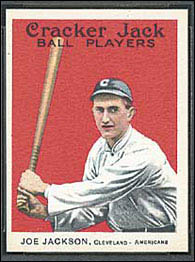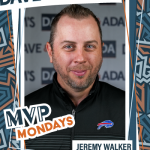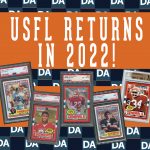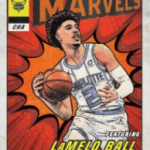To read the first part of the interview click here.
This is an interview that was conducted in 2002 by Pepper Hastings for Beckett Direct, we stumbled over it and figured it would be interesting to post:
BDD: What are the 5 DO’s and DON’Ts you would offer as advice to a hard-working person who says he’s going to open up a collectibles shop later this year?
AM:
DO:
1) Load it up with unopened boxes: No one ever walked out of a card store and complained that the store had too much of a selection of unopened packs and boxes. If you don’t have enough money to put into fixtures, single, or memorabilia, that’s okay. If you don’t have enough money to load your store with an impressive display of packs and unopened boxes, then you probably shouldn’t open yet.
2) Treat every customer like he is your last: I don’t care if you had a rough night and are in the worst mood of your life. If someone comes in, greet him, ask him if he needs help, make conversation. If you don’t have what he is looking for, but are genuinely pleasant to be around, he will probably come in again.
3) Make your store a nice place to be: Keep it clean, don’t let neighborhood kids use it as a hangout, don’t have stacks of commons piled on your showcases, don’t smoke or eat in front of your customers, put on a clean shirt, etcetera. If you’re a slob, and you know if you are, keep it away from your store. You are a reflection of your business. Fake it if you have to.
4) Spend your money wisely: First of all, the markets shifts up and down. Sometimes buying direct or from a distributor is the best way to go. Sometimes buying off the Internet or at shows is best. Deal with a lot of sources and find the best prices. Also, don’t buy big deals of single cards or other slow moving inventory if you can’t sell them quickly. If you continue to move through packs and boxes at fair margins and at regular intervals, you will find yourself making money.
5) Travel: Almost right from the beginning we began to travel to larger shows. You can sell of extra inventory, buy new inventory at decent levels, and make connection you can’t make from home. This philosophy is the single most important thing we did to grow the business. The more contacts you make and the more friends you have in this industry, the more money you will make.”
DON’T:
1) Think it will be easy: The 5-day, 40 hour work week is over. I worked 80-hour weeks for five straight years. I had no wife or children so I was able to be 100 percent dedicated to growing the company. If you have a family to support you might not want to open this or any other business that requires a lot of work and self-sacrifice.
2) Open your store where no one will see it: “Location, location, location.” Rent the biggest store, in the most well traveled area you can afford. Strip plazas are my favorite as malls are often too high-end rent-wise. If you can’t afford a big sing, then window paint will do nicely. Plus, don’t forget about parking.
3) Trust others blindly: People will steal from you, so get used to it. Keep your expensive packs and valuable items under glass or out of arm’s reach.
4) Make your margins too high: Every card dealer has an idea of what size margins are right for them. My answer is to make your margins as high as you can without hindering sales. It’s one of the hardest things to do. You are not only competing with the Internet and other dealers, you are competing with Toys ‘R’ Us and any other place that people can spend their extra money.
5) Give up: It’s a long road, but the rewards are great.
BDD: Dave and Adam’s is known for its steady stream of effective advertising in trade and consumer hobby publications. Explain why advertising is so crucial in this business.
AM: To really grow a business you have to look beyond your region. Whether you want to buy or sell, it really helps to get your name out there. It took us a few years before we could afford to do all the advertising that we wanted. Now, it’s the single most important thing we do. When people know you and recognize you as a company that won’t defraud them, they naturally feel more comfortable dealing with you.
BDD: Many shop owners feel they are too small to advertise. What are your thoughts on this?
AM: We started with small ads that were very effective. Many local newspapers have great rates for classified ads and they work. E-mail is free, so take advantage of it for both local and national contact. IF you feel that collectors would embrace something about your business, then you have to advertise it.
BDD: Was there any particular “find” or “big lot buy” that really helped to catapult you all to the next level of success?
AM: We sank a lot of money into 1992 Bowman Football and Hockey unopened boxes. Following the popularity of Bowman Baseball we started buying as many boxes of Football and Hockey as we could afford. When Baseball was at $150, Hockey and Football were still at $60. In the summer of 1993 our second National in Chicago we had 60 boxes of each and sold out at $300 and $400. After that, we had enough money to open a much large store in the suburbs.
BDD: What’s the biggest lots of stuff you’ve ever purchased?
AM: We’ve been fortunate to buy some pretty large deals. One purchase we made last year filled up four 18-wheel trucks, top to bottom. We had to teams of workers off loading and storing inventory for almost 40 straight hours.
BDD: People in our industry know you as a gregarious, sales-oriented dealmaker. What would people be surprised to learn about Adam Martin?
 I have a staff of 35 excellent people (note: it is now 70) who make life much easier for me. I travel quite a bit, a lot of which is unrelated to business. I still collect Shoeless Joe Jackson and Roberto Clemente cards as well as a few Pre-WWII sets such as the Goudey Sports Kings. I only attend a few shows a year, although I still really enjoy them. Most importantly, I got married last year and we are expecting our first child this fall.
I have a staff of 35 excellent people (note: it is now 70) who make life much easier for me. I travel quite a bit, a lot of which is unrelated to business. I still collect Shoeless Joe Jackson and Roberto Clemente cards as well as a few Pre-WWII sets such as the Goudey Sports Kings. I only attend a few shows a year, although I still really enjoy them. Most importantly, I got married last year and we are expecting our first child this fall.
BDD: Are there any people in this industry you would consider mentors or who took time and effort to help you learn about the business?
AM: Sure, I worked in a card store called 7th Inning Stretch in Buffalo in the mid 80’s. The owner, Paul Holbrook, taught me a lot. He’s still going strong today.
Related Posts
 1-888-440-9787
1-888-440-9787
 We Ship Internationally
We Ship Internationally
 FREE Gifts with orders $100+
FREE Gifts with orders $100+








What about the scooper ??
Didn’t we score a lot of scoops at the National Conventions and Super Bowl shows
?
Great to see you are doing well !!! Awesome